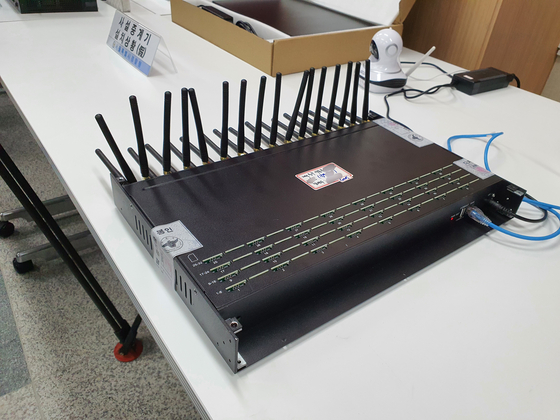“If you install the router, we will give you 50,000 won a week. We are developing an app that allows you to use Korean numbers without roaming.”

A’private repeater’ released by the voice phishing intensive response team of the Seoul Police Agency. This machine, an Internet router, modulates phone numbers from overseas to domestic numbers such as ’02’, ‘010’, and ‘1588’. Reporter Kyung-Hyun Kyung-Hyun
This is a text message from a’business company’ by A, a woman in her 30s, who saw the announcement of recruitment for part-time work from home on October 31 last year. When Mr. A replied, “I’ll start,” the business side received a promise that “there will be four or so, and you shouldn’t say you can’t do it after the goods arrive.” However, this private repeater installed by Mr. A in the house was used to alter the Internet phone numbers used by Chinese voice phishing criminals into Korean numbers starting with ‘010’. Mr. A, who was caught by the police, said, “I didn’t know that my actions would help the crime.”
“If you see this machine, please report it.”
The’Intensive Response Team’, a voice phishing comprehensive control tower of the police, is actively promoting similar cases to Mr. A. He warned that more and more cases were being investigated after installing a private repeater because of an advertisement called’Internet monitoring side job and home-time job’. The voice phishing organization, which has become a business, uses a method of installing a repeater in Albasaeng’s house and paying hundreds of thousands of won per month. Police believe the private repeater serves to make it difficult to suspect a voice phishing crime.

Chat content that recruits repeater managers. Photo courtesy of Seoul Police Agency
Last year, the Seoul Police Agency pursued intensive crackdowns from the middle of last month until recently after tracking voice phishing crimes in which a’private repeater’ was used. During this period, the police found and demolished 161 private repeaters in 52 locations across the country. 203 SIM chips, 7 home cameras, 1 laptop, and 25 cannon phones were also found. In addition, 13 people involved in the installation of repeaters at the site were arrested for violating the Telecommunications Business Act and for fraud. One who knew that the double repeater would be used for the crime was immediately arrested. A police official who participated in the investigation said, “If you see a suspicious router in the house, please report it to the nearby police station without delay.”
600 million won per day in Seoul alone
The Seoul Metropolitan Police Agency announced its goal of “reducing 50% of voice phishing, an anti-social civil life violation.” Although efforts have been made to prevent voice phishing crimes, the number of crimes and the amount of damage have increased. According to the police, 7774 cases of voice phishing crimes in the Seoul area occurred in 2017 (damage amount of 93.7 billion won), but in 2020, it increased to 9049 cases (222.8 billion won). Last year, in Seoul alone, there were 25 voice phishing damages a day (600 million won). The number of voice phishing cases nationwide was 31681 (700 billion won) last year.
Police, intensive response team’expanded operation’
To this end, the Seoul Police Agency announced that it will expand and organize the’Voice Phishing Intensive Response Team’, which was established in the investigation department in November last year. It is because each police station has not been able to reduce the scale of the crime by investigating the criminals individually. It turned out that the voice phishing crime investigated by the Gangseo Police Station, Gwanak Police Station, and Jungrang Police Station last year was a crime committed by the same organization. The intensive response team will share voice phishing crime data with all police stations in the Seoul area and use it for investigation.

A residential area with a private repeater detected by the police. Photo courtesy of Seoul Police Agency
In addition, the police plan to block voice phishing crimes in advance, which are carried out step by step through cooperation with related organizations. The police report that voice phishing proceeds in four stages:’text, SNS, voice access → installation of malicious apps → grant of damages’, and at each stage, they cooperate with the IT industry and the financial sector. You can discuss technologies to block malicious apps with the IT industry, and revitalize the reporting system for large cash withdrawals with the financial sector.
A police official said, “We will detect private repeaters, applications, cannon phones, SIM chips, etc. that are used for criminal purposes as soon as possible to prevent damage,” he said. “We are discovering various investigation techniques for this purpose.”
Reporter Kyung-Hyun Kyung-Hyun [email protected]
![]()
